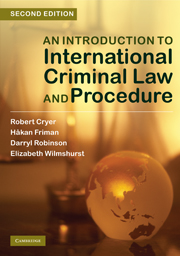Book contents
- Frontmatter
- Contents
- Preface to the Second Edition
- Table of Cases
- Table of Treaties and other International Instruments
- Table of Abbreviations
- PART A INTRODUCTION
- 1 Introduction: What is International Criminal Law?
- 2 The Objectives of International Criminal Law
- PART B PROSECUTIONS IN NATIONAL COURTS
- PART C INTERNATIONAL PROSECUTIONS
- PART D SUBSTANTIVE LAW OF INTERNATIONAL CRIMES
- PART E PRINCIPLES AND PROCEDURES OF INTERNATIONAL PROSECUTIONS
- PART F RELATIONSHIP BETWEEN NATIONAL AND INTERNATIONAL SYSTEMS
- Index
- References
1 - Introduction: What is International Criminal Law?
from PART A - INTRODUCTION
Published online by Cambridge University Press: 05 June 2012
- Frontmatter
- Contents
- Preface to the Second Edition
- Table of Cases
- Table of Treaties and other International Instruments
- Table of Abbreviations
- PART A INTRODUCTION
- 1 Introduction: What is International Criminal Law?
- 2 The Objectives of International Criminal Law
- PART B PROSECUTIONS IN NATIONAL COURTS
- PART C INTERNATIONAL PROSECUTIONS
- PART D SUBSTANTIVE LAW OF INTERNATIONAL CRIMES
- PART E PRINCIPLES AND PROCEDURES OF INTERNATIONAL PROSECUTIONS
- PART F RELATIONSHIP BETWEEN NATIONAL AND INTERNATIONAL SYSTEMS
- Index
- References
Summary
International criminal law
International law typically governs the rights and responsibilities of States; criminal law, conversely, is paradigmatically concerned with prohibitions addressed to individuals, violations of which are subject to penal sanction by a State. The development of a body of international criminal law which imposes responsibilities directly on individuals and punishes violations through international mechanisms is relatively recent. Although there are historical precursors and precedents of and in international criminal law, it was not until the 1990s, with the establishment of the ad hoc Tribunals for the former Yugoslavia and Rwanda, that it could be said that an international criminal law regime had evolved. This is a relatively new body of law, which is not yet uniform, nor are its courts universal.
International criminal law developed from various sources. War crimes originate from the ‘laws and customs of war’, which accord certain protections to individuals in armed conflicts. Genocide and crimes against humanity evolved to protect persons from what are now often termed gross human rights abuses, including those committed by their own governments. With the possible exception of the crime of aggression with its focus on inter-State conflict, the concern of international criminal law is now with individuals and with their protection from wide-scale atrocities. As was said by the Appeal Chamber in the Tadić case in the International Criminal Tribunal for the former Yugoslavia (ICTY):
A State-sovereignty-oriented approach has been gradually supplanted by a human-being-oriented approach … [I]nternational law, while of course duly safeguarding the legitimate interests of States, must gradually turn to the protection of human beings […]
- Type
- Chapter
- Information
- Publisher: Cambridge University PressPrint publication year: 2010
References
- 6
- Cited by



